Former special counsel Robert S. Mueller III testified before two house committees today. It’s the first time he’s answered questions in public since taking over the Russia investigation more than two years ago.
Watch the hearing live | Read the Mueller report | Read our analysis
- Share via
Analysis: Mueller’s testimony seems unlikely to boost impeachment — but could vindicate Pelosi
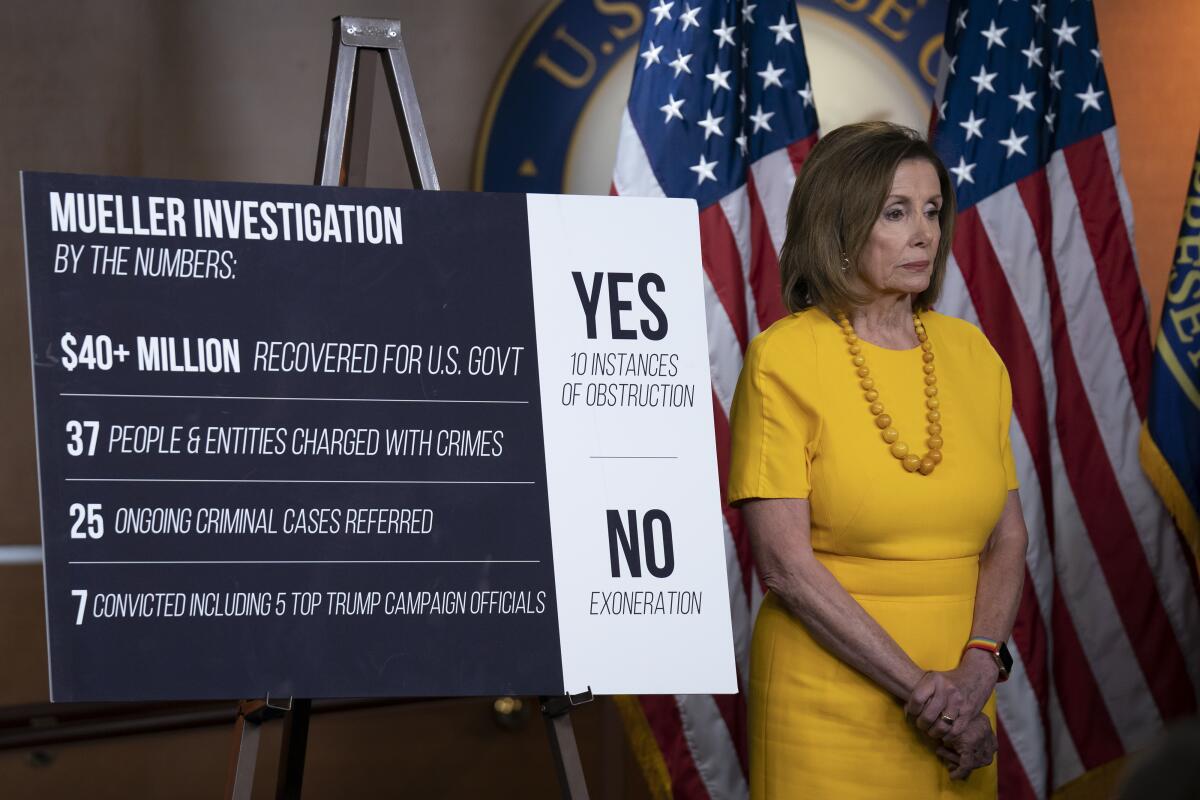
Robert S. Mueller III did little on Wednesday to boost the prospects of impeaching President Trump.
The former special counsel’s highly anticipated testimony before Congress did not deliver the sort of splashy moment that circulates on cable TV. Instead, as he promised, he stuck carefully to the text of his investigative report, occasionally — at times haltingly — offering a nuance, but often providing one-word answers to questions.
The result seemed likely do little more than harden the opinions held by the public — and lawmakers — on President Trump and whether he should be removed from office.
For House Speaker Nancy Pelosi, that result may come as a vindication. Despite pressure from some Democrats, Pelosi has held her caucus back from starting an impeachment inquiry out of concern that it could politically backfire without broad, bipartisan support.
- Share via
Mueller finishes a day of testimony
- Share via
Mueller says he didn’t pursue a subpoena because of likely court fight
Former special counsel Robert S. Mueller III said he did not pursue a sworn interview and subpoena of President Trump because he reasoned it would likely result in a lengthy court battle that would further drag out the investigation.
“The expectation was if we did subpoena the president, he would fight the subpoena and we would be in the midst of the investigation for a substantial period of time,” Mueller said under questioning from Rep. Sean Patrick Maloney (D-N.Y.).
Maloney suggested that Mueller might not have issued the subpoena because he had enough evidence to already indicate that the president obstructed justice. Mueller did not directly agree with the statement and instead said he had to balance the interest in an interview with the evidence that his team had already compiled.
“We had to make a balanced decision in terms of how much evidence we had compared to the length of time [in court],” Mueller said.
Mueller reiterated that he had legal authority to issue the subpoena and was under negotiation for the interview for over a year. He refused to say whether the president claimed the 5th Amendment to avoid incriminating himself under oath
- Share via
Mueller criticizes Trump’s praise of WikiLeaks: ‘Problematic is an understatement’
Robert Mueller has been reluctant to render moral judgment on Trump’s conduct, but he made an exception when asked about the president’s previous praise for WikiLeaks.
When the organization was releasing hacked Democratic Party emails during the 2016 campaign, Trump routinely helped spread the damaging information about Hillary Clinton, and declared, “I love WikiLeaks!” The emails had been stolen by Russian military intelligence officers, according to the special counsel’s office.
Asked about Trump’s comments on WikiLeaks by Rep. Mike Quigley (D-Ill.), Mueller said, “Problematic is an understatement.” He said they could provide “some boost to what is and should be illegal activity.”
- Share via
Moscow mystery remains following the Mueller report
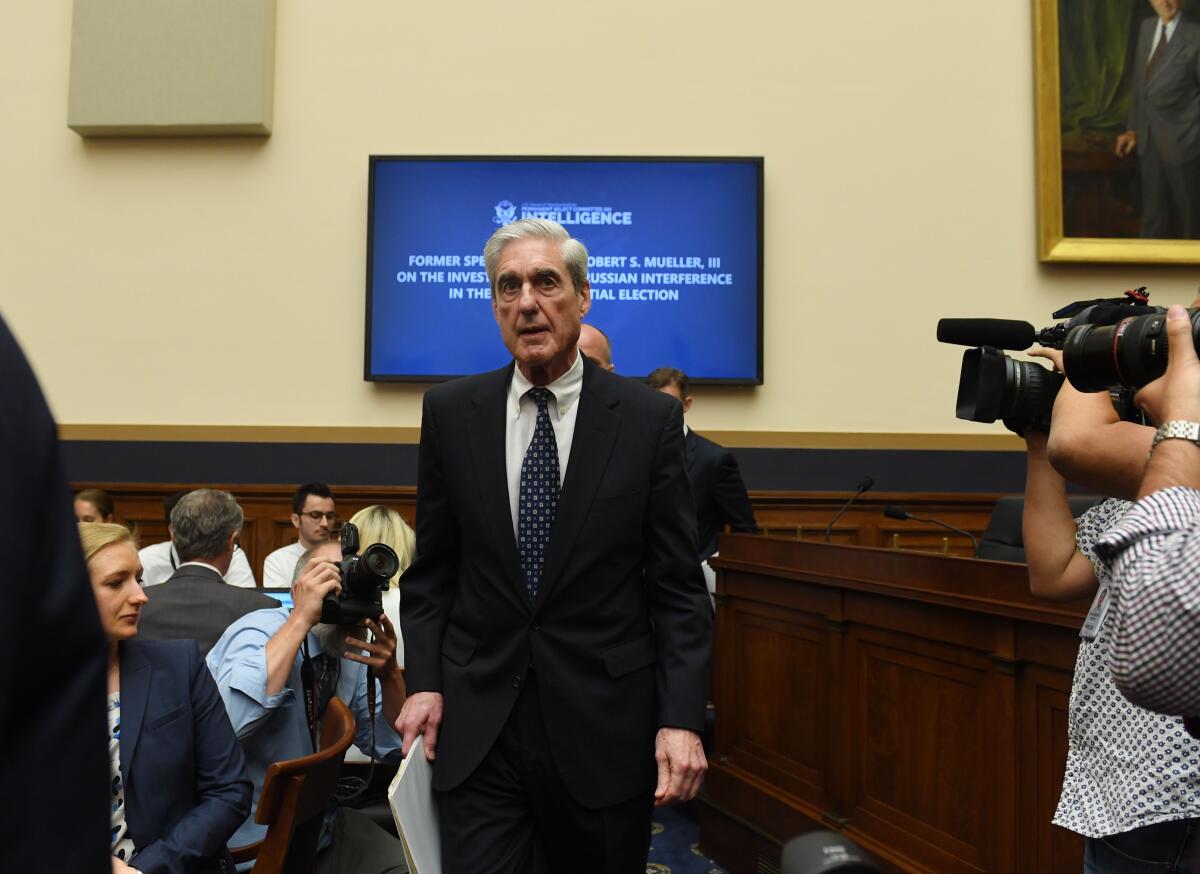
One mystery about the Russia investigation has endured even after the Mueller report was released — what happened to the counterintelligence probe?
The investigation began in July 2016 not as a criminal case, but as an examination of Moscow’s covert meddling in U.S. politics. It eventually developed into a series of prosecutions that Robert S. Mueller III led after being appointed special counsel in May 2017.
Because his office was focused on prosecuting crimes, Mueller told the House Intelligence Committee that it never reached conclusions on counterintelligence questions.
Instead, relevant information was passed back to the FBI.
“Members of our office periodically briefed the FBI about counterintelligence information,” he said. “In addition, there were agents and analysts from the FBI who were not on our team, but whose job it was to identify counterintelligence information in our files and disseminate that information to the FBI.”
He declined questions about the counterintelligence probe, leaving the rest of its mysteries intact.
- Share via
Schiff opens questioning during House Intelligence hearing
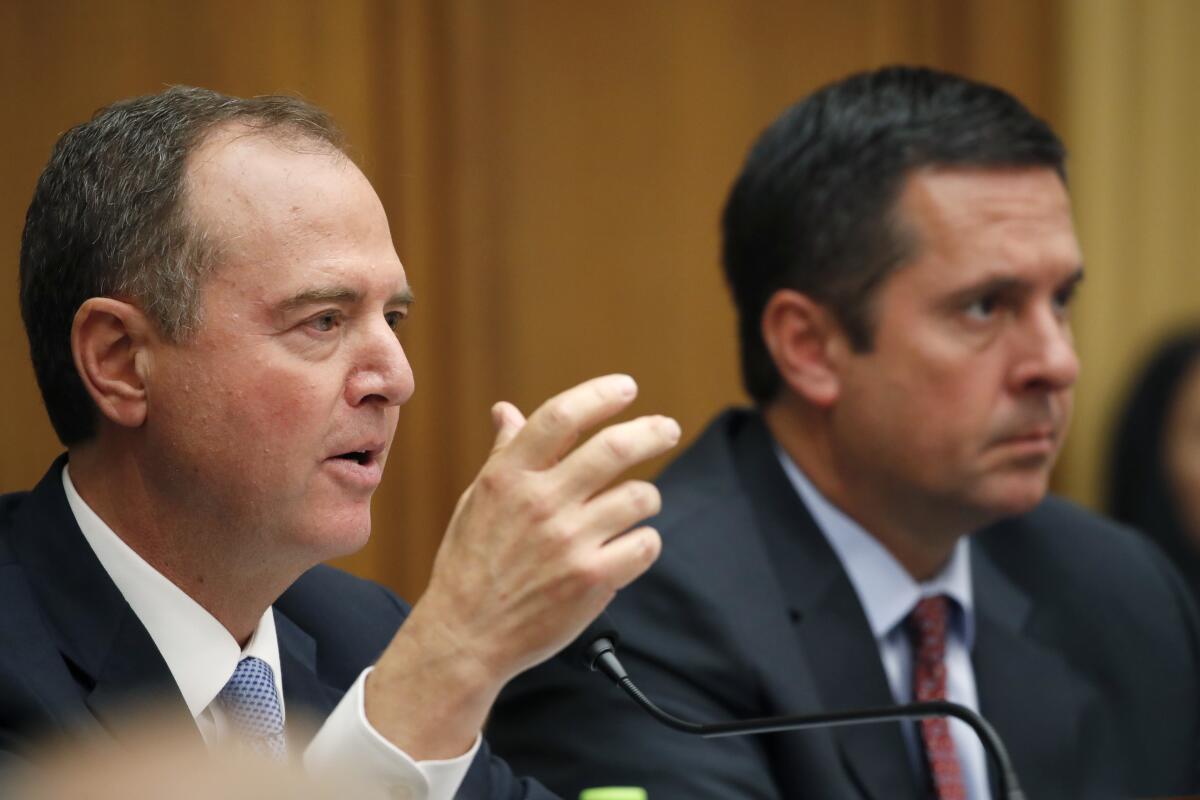
Robert Mueller did not establish a criminal conspiracy between President Trump’s campaign and Russia, but Rep. Adam Schiff (D-Burbank) focused his opening questions on the symbiotic relationship between the two.
He pointed out that Mueller’s report showed Trump welcomed Moscow’s interference, which included hacked Democratic Party emails that were released by WikiLeaks.
“The Trump campaign officials built their messaging strategy around those stolen documents?” Schiff asked.
“Generally that’s true,” Mueller responded.
“And then they lied to cover it up?” Schiff asked.
“Generally that’s true,” Mueller said again.
- Share via
Read Mueller’s opening statement to the House Intelligence Committee

Former special counsel Robert S. Mueller III delivers his opening statement to the House Intelligence Committee.
Read former special counsel Robert Mueller’s second opening statement, read before the House Intelligence Committee on Wednesday.
- Share via
Mueller issues ‘correction’ to earlier exchange with Rep. Ted Lieu

Torrance Republican Rep. Ted Lieu wants to know the bottom line on why the Mueller report did not indict President Trump.
Former special counsel Robert S. Mueller III this afternoon issued a “correction” to perhaps one of the splashiest moments from his morning appearance before Congress.
He said that he incorrectly told Rep. Ted Lieu (D-Torrance) that he didn’t charge the president with a crime because of DOJ’s Office of Legal Counsel opinion that prohibits indicting a sitting president. The statement went further than anything Mueller or his report had previously said, and Democrats viewed it as an important admission.
But at the start of his testimony before the House Intelligence Committee, Mueller walked back the statement.
“That is not the correct way to say it,” Mueller said. “We did not reach a determination as to whether the president committed a crime.”
- Share via
Watch: Is there an echo in the House? ‘No one is above the law’ is repeated at Mueller testimony

The phrase “no one is above the law” was invoked repeatedly by House members during the Judiciary Committee hearing in which former special counsel Robert S. Mueller III testified.
The phrase “no one is above the law” was invoked repeatedly by House members during the Judiciary Committee hearing in which former special counsel Robert S. Mueller III testified.
- Share via
Mueller testimony: Read the prepared opening statement from House Intelligence Chairman Adam Schiff
Read the prepared opening statement from Rep. Adam B. Schiff (D-Burbank), chairman of the House Intelligence Committee, here.
- Share via
During the break between the two hearings, both parties put their spin on the proceedings
House Republicans declared victory, saying that the former special counsel’s testimony didn’t bolster the case for impeachment and likely shifted public opinion toward President Trump.
“No one could have watched the hearing and walked away believing that Director Mueller had a firm grasp of the details of the 448-page report,” Rep. Mark Meadows (R-N.C.) said.
“It’s probably predetermined where the Democrats want to go with this, but at the same time I think the American people will see it as time to turn the page, close the book, finish the chapter, and get on with life.”
Rep. Matt Gaetz called the hearing “unequivocally a great day for Republicans.”
“One thing that I’m certain of is that Trump’s tenure in office may very well have been extended by four years as a consequence of this hearing,” he said. “The American people see that the entire origin of this investigation was so corrupt and so rotten that even Robert Mueller wouldn’t answer questions about it.”
On the Democratic side, Rep. Al Green of Texas, a prominent advocate of impeachment, said he didn’t think the hearing had been necessary because Mueller’s report already provided evidence of impeachable offenses.
“Mr. Mueller has given us a road map to impeachment,” he said.
“We’re starting to engage with the paralysis of analysis, such that at some point we’ll say, ‘Too late to impeach. Let’s defeat at the polls.’ And then the suffering that [Trump] has caused will be minimized to the extent that history won’t be kind to us,” he said.
- Share via
We’ve reached halftime at the House
- Share via
Conservative students stop by to express support for Trump
For a group of students who are in town for the Turning Point USA Convention, today’s hearing marks an opportunity to support a president whom they favor.
“We were just at the convention and heard about the hearing and thought, ‘Why not come support our president, who had no obstruction and no collusion?’” said Cole Larson, who traveled to Washington from Utah.
Larson said he doesn’t think the Mueller inquiry was fair. But he thinks the special counsel’s findings exonerated the president — a conclusion Larson said he agrees with.
“They found out what they were supposed to find out — that he’s not guilty,” Larson said.
- Share via
Mueller resisted responding to criticisms — until this moment

Republican Rep. Tom McClintock of California chastises Mueller report: “You put it in a paper sack, lit it on fire .. rang the doorbell and ran.”
Republicans largely played to Trump’s base throughout the first several hours of today’s hearing, defending the president and attempting to undermine former Special Counsel Robert S. Mueller III’s credibility.
Rep. Matt Gaetz (R-Fla.) accused Mueller’s team — which once included FBI agent Peter Strzok, whose anti-Trump text messages later became public — of being biased against the president. Rep. Tom McClintock (R-Elk Grove) chastised the report as a partisan statement.
“It’s starting to look like, having desperately tried and failed to make a legal case against the president, you made a political case instead,” McClintock said. “You put it in a paper sack, lit it on fire, dropped it on our porch, rang the doorbell and ran.”
Throughout the hearing, Mueller did little to push back on the criticisms of his report, but McClintock’s comment prompted him to respond.
“I don’t think you have reviewed a report that is as thorough, as fair, as consistent as the report that we have in front of us,” he said.
- Share via
Score one for the Democrats
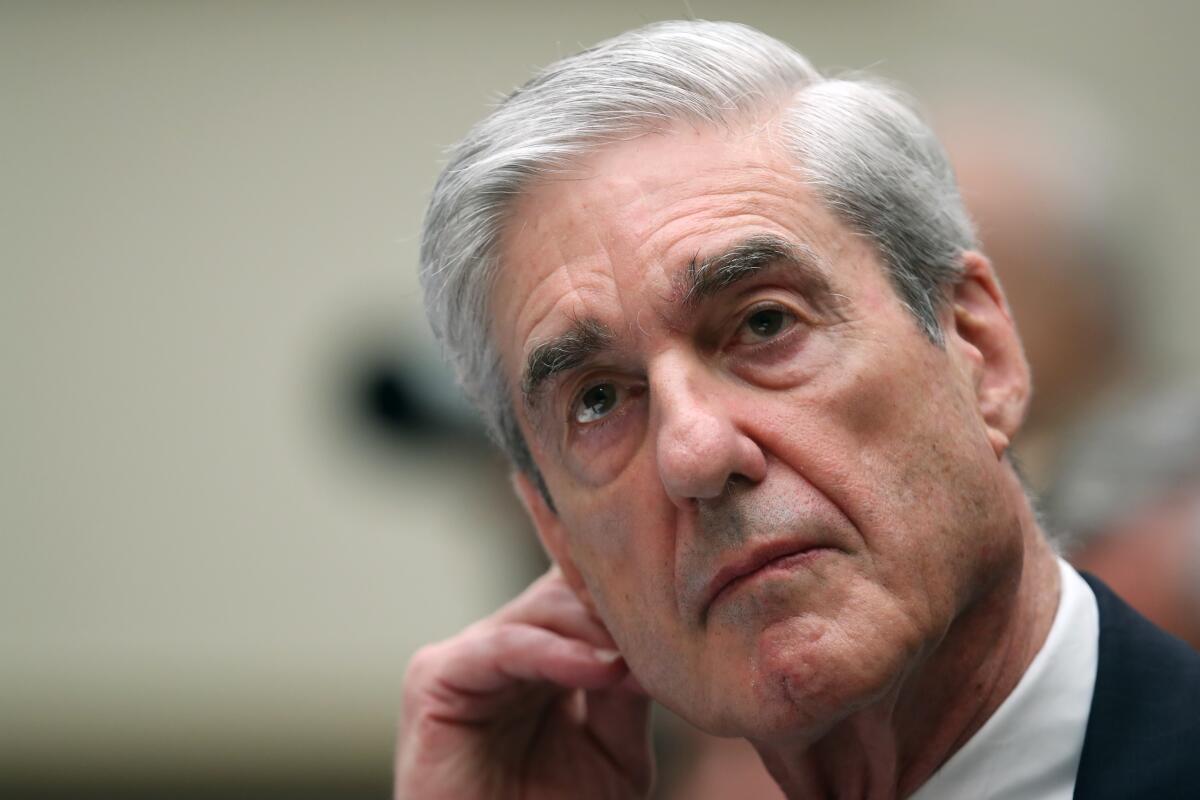
Democrats may have just secured the moment they wanted from today’s testimony. Rep. Ted Lieu (D-Torrance) was questioning Robert Mueller about his investigation into obstruction of justice when he asked him about Justice Department guidelines that prevent indicting a sitting president.
“The reason you did not indict Donald Trump is because of [Office of Legal Counsel] opinion stating that you cannot indict a sitting president?” Lieu said.
“That is correct,” Mueller responded.
The statement matters because Trump and his supporters have asserted that Mueller’s report found “no obstruction.” Democrats, by contrast, have argued that “anyone else” who did what Trump did would have been indicted.
Republicans appeared concerned about Mueller’s answer, and Rep. Debbie Lesko (R-Ariz.) modified her prepared questions to accuse Mueller of contradicting himself.
“That is not what you said in the report,” she said.
Mueller’s report said prosecutors did not reach a conclusion on whether Trump broke the law because a sitting president cannot be charged.
- Share via
Mueller declines to say when his team reached conclusion that Trump had not conspired with the Russians
Robert S. Mueller III declined to say when his team reached the conclusion that President Trump had not conspired with the Russians to interfere into the 2016 elections.
Republicans have suggested that Mueller’s office determined early in the 22-month investigation that Trump hadn’t colluded with Moscow. Nevertheless, Mueller waited until his report was released in April to disclose that key finding.
“When did you personally reach that conclusion?” Rep. Andy Biggs (R-Ariz.) asked Mueller. “At some point you had to come to a conclusion that I don’t think there is not a conspiracy going on here, between this president … and the Russians.”
“Developing a criminal case you get pieces of information, witnesses and the like as you make your case, and when you make a decision on a particular case depends on a number of factors,” Mueller said. “I cannot say specifically when we reached a decision on a particular defendant at a particular point in time.”
“But it was sometime well before you wrote the report?” Biggs asked. “Certainly at some time prior to that report, you reached that decision, in regard to the president, ‘I don’t find anything here.’ Fair enough?”
“I’m not certain I do agree with that,” Mueller replied.
- Share via
Democrats want Mueller testimony to paint a narrative. Mueller isn’t cooperating
Democrats wanted to use today’s hearing to connect the dots in Robert S. Mueller III’s report, using a constellation of facts spread across a 448-page document to show that President Trump obstructed justice.
Mueller’s answers have not always been helpful for that task, and he’s fallen into a clear rhythm when responding to Democrats. He’ll confirm specific facts from his report but stop short of supporting their attempts to paint a larger narrative.
For example, Rep. David Cicilline (D-R.I.) asked Mueller about Trump’s effort to have Corey Lewandowski, his former campaign manager, tell Jeff Sessions, then the attorney general, limit the Russia investigation.
With monosyllabic answers, Mueller confirmed the details of the case. But when Cicilline tried to string them all together into a single question, the former special counsel balked.
“I’m not going to adopt your characterization, but I would say the facts that are laid out in the report are accurate,” he said.
- Share via
What do public opinion and polling say about Mueller’s testimony?
For weeks leading up to today’s hearing, both sides have wondered whether Robert S. Mueller III’s testimony would sway public opinion on the question of whether Congress should impeach President Trump.
Even before Mueller began to speak, the odds were strongly against that, as the public reaction to previous episodes in the investigation showed. For example, on May 29, when Mueller made his last public statement and announced he would step down, he said, “If we had confidence that the president did not commit a crime, we would have said so.”
Polling by YouGov showed that 90% of Hillary Clinton voters who said they had seen or heard Mueller’s statement concluded that Mueller’s report “did not clear Trump of any wrongdoing.”
But among Trump voters, only 15% shared that conclusion. Three-quarters of Trump voters who said they had seen or heard Mueller’s statement still said the report “clears Trump of any wrongdoing,” the poll found.
Voters who pay the most attention to news and public affairs are, overwhelmingly, the most partisan Americans. And, as years of public opinion studies have shown, partisans on both sides tend to find ways to fit new pieces of evidence into their preexisting views.
- Share via
Streaming, reading and tic-tac-toe as would-be spectators accept their fate
A little more than an hour into Robert S. Mueller III’s testimony, people at the end of the line to enter the hearing room are starting to lose hope.
Some have been camped out for hours, but they say it’s unlikely they’ll get in.
Hashim Syed, who was near the end of the line as of 9:45 a.m. Eastern, said he’s “not that optimistic anymore.”
“When I came in, the line moved a little bit and then right now, it hasn’t moved,” he said. “It’s looking like a no.”
In the meantime, people in line are trying to amuse themselves. They’re chatting, reading and playing tic-tac-toe. And many are streaming Mueller’s testimony on their phones.
“I’ve been looking at videos, seeing what’s going on, obsessing over the line,” said Ryan Couture, who said he’s holding out hope that he’ll make it into the hearing room. “That’s basically all you can do.”
- Share via
Mueller dismisses conflict of interest claims by Trump
Former Special Counsel Robert S. Mueller III dismissed claims by President Trump that he had conflicts of interest that should have blocked him from leading the investigation into Russia’s interference into the 2016 election and Trump’s possible obstruction of justice.
Under questioning by Rep. Louie Gohmert (R-Texas), Mueller also denied he had been a candidate to lead the FBI after Trump fired director James B. Comey in 2017. Mueller confirmed that he discussed the FBI director job with Trump but “not as a candidate.” Mueller also said that the Justice Department cleared him of any conflicts of interests before he took the job.
Trump has alleged that Mueller was a candidate for the FBI director’s post. Earlier Wednesday, Trump tweeted that if Mueller denied under oath that he had interviewed for the FBI job, Vice President Mike Pence could serve as a witness to refute Mueller. Trump’s close advisors told Mueller’s investigators that they had tried to tell Trump that accusations of conflicts of interest were ridiculous, according to the special counsel’s report.
Another allegation thrown at Mueller by Republicans is that he was a close friend of Comey’s. Mueller downplayed such ties, noting he hadn’t spoken to Comey in the six months before he was appointed. At first, he said they were only “business associates” but later confirmed they had, indeed, been “friends.”
- Share via
Responses from Mueller? Simple and to the point.
Robert Mueller promised to stick to his report in his testimony, and after more than an hour of questioning he’s done just that. He has repeatedly said some version of “I stand by my report” or “I refer you to the report.”
When the former special counsel answers questions directly, he’s kept his responses staccato, often a simple “true” or “correct” as Democrats described the findings of the Russia investigation.
Sometimes it is hard to hear Mueller in the hearing room, and Rep. Jerrold Nadler (D-N.Y.), the chairman, has reminded him more than once to speak into the microphone. Mueller did not want to testify — he only agreed after being issued a subpoena — and his reluctance occasionally shows in his laconic approach.
Mueller, 74, has often asked lawmakers to repeat their questions — he asked Rep. Doug Collins (R-Ga.), an admitted fast talker, to slow down — or deflected by referring to his report.
It’s unclear how viewers at home may perceive Mueller. Those who watch the entire hearing may view him as a shaky, hesitant witness. But on the evening news and cable talk shows, which have much larger audiences, the testimony likely will be chopped into short soundbites, frequently replayed, which could increase the impact of Mueller’s one-word answers.
- Share via
Mueller refuses to elaborate on his private letter to Atty. Gen. William Barr
Mueller declined to address any disagreements he had with Atty. Gen. William Barr over the four-page letter that Barr wrote that summarized the investigation’s conclusions.
“I am not going to get into that,” Mueller said.
After Barr’s summary was released, Mueller wrote a private letter to the attorney general complaining that it did not “fully capture the context, nature and substance of this office’s work and conclusions.”
Republican Rep. Martha Roby of Alabama asked Mueller about how that letter became public, a question that Mueller said he could not answer.
- Share via
Mueller’s answer contradicts Atty. Gen. William Barr
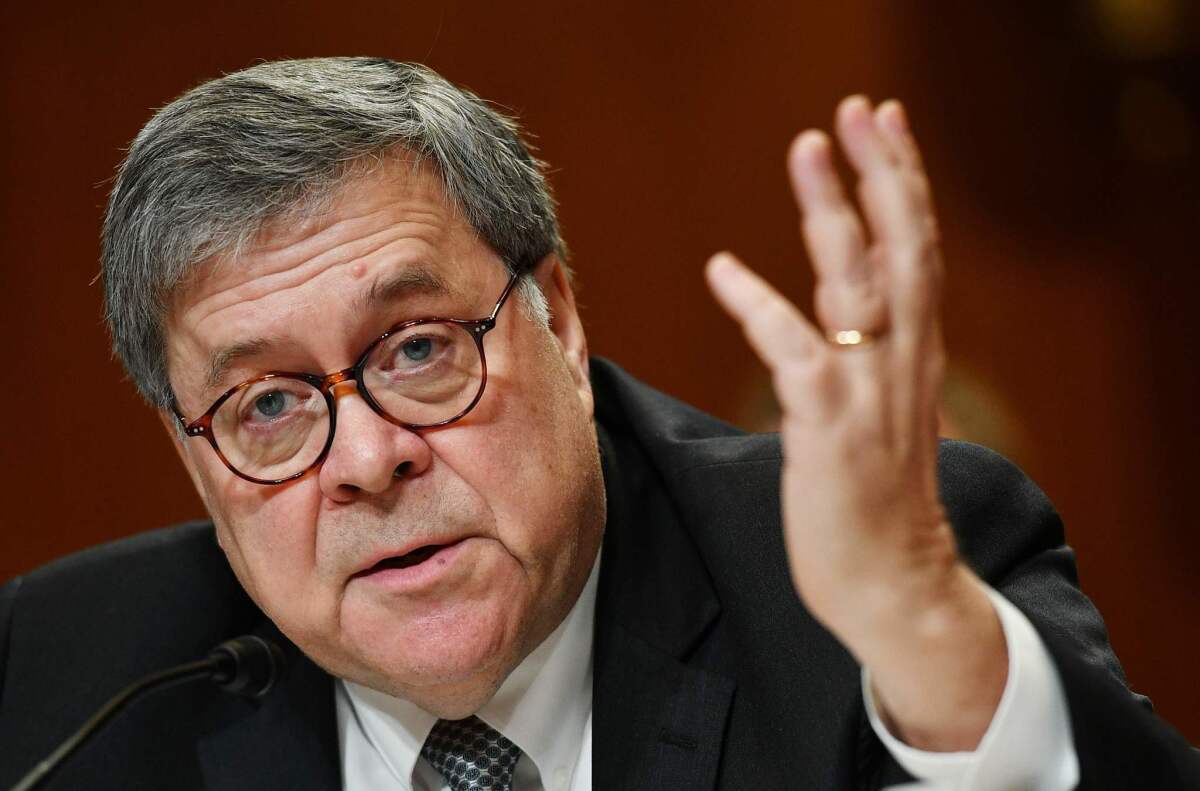
In response to a question from Rep. Sheila Jackson Lee (D-Texas), Mueller confirmed that actions by President Trump to protect himself would be a “corruptly motivated act.”
Jackson Lee recited a litany of quotes pulled from Mueller’s report.
“Actions by the president to end a criminal investigation into his own conduct to protect against personal embarrassment or legal liability would constitute a core example of corruptly motivated conduct? Is that correct?” she said, quoting the report.
“Yes,” Mueller replied.
Mueller’s answer contradicts Atty. Gen. William Barr, who said he doubted that Trump had “corrupt intent to obstruct the investigation.” He described Trump as simply “frustrated and angered by a sincere belief that the investigation was undermining his presidency.”
- Share via
Did Robert Mueller go beyond his mandate?
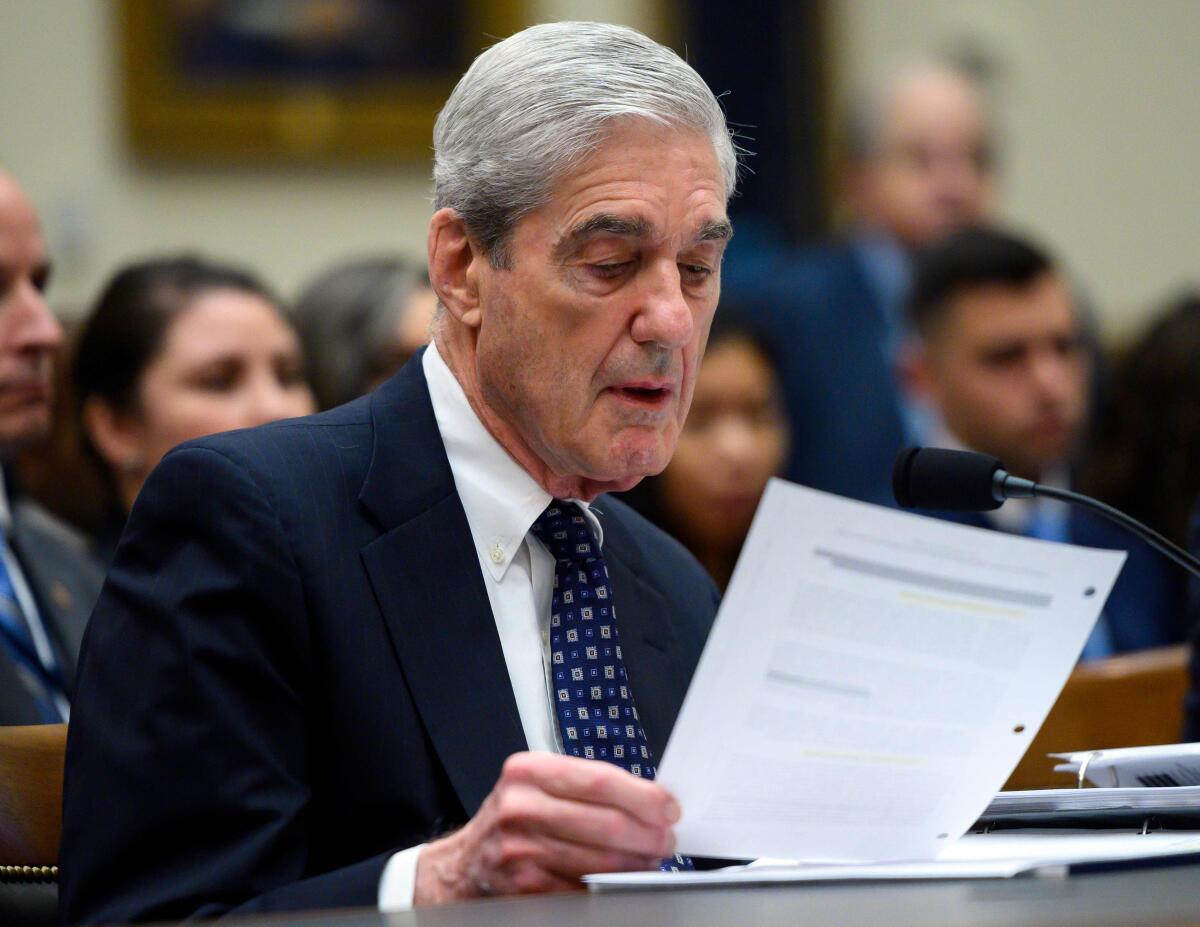
Rep. John Ratcliff (R-Texas) hammered Mueller for saying in his report that Trump was not exonerated by the investigation. He called that statement a departure from Justice Department tradition that says prosecutors should make a black-or-white decision on whether to pursue criminal charges, not deliver judgments on guilt or innocence.
“The bedrock principle of our justice system is the presumption of innocence,” Ratcliffe said. “Everyone is entitled to it, including sitting presidents.”
“This is a unique situation,” Mueller said as he defended his decision, an apparent reference to the Justice Department policy that says a sitting president can be investigated but can’t be indicted.
- Share via
Rep. Lofgren homes in on Manafort’s role
Rep. Zoe Lofgren (D-San Jose) questioned Robert S. Mueller III extensively about Paul Manafort, who was President Trump’s campaign chairman, providing detailed campaign polling data to an associate who the FBI believes has ties to the Russian intelligence services. Mueller confirmed that his report concluded that Manafort provided polling information in 2016 to Konstantin Kilimnik, a Russian and Ukrainian citizen who once had worked for Manafort’s consulting firm.
Mueller declined to say who in the Trump campaign may have told Manafort to share the polling data with Kilimnik.
“The Russians wanted Trump to win,” Lofgren said. “The Russians went on a sweeping cyber-influence campaign.”
“The Russians hacked the DNC,” she said, referring to Mueller’s findings that the Kremlin siphoned sensitive emails and information from the Democratic National Committee’s computers.
“The Trump campaign chairman met with Russian agents and gave them polling and messaging information,” she added.
The stolen information and the polling data obtained from Manafort, Lofgren said, allowed Moscow to better target its propaganda and misinformation on social media.
- Share via
A soundbite that Trump is likely to point to in the future
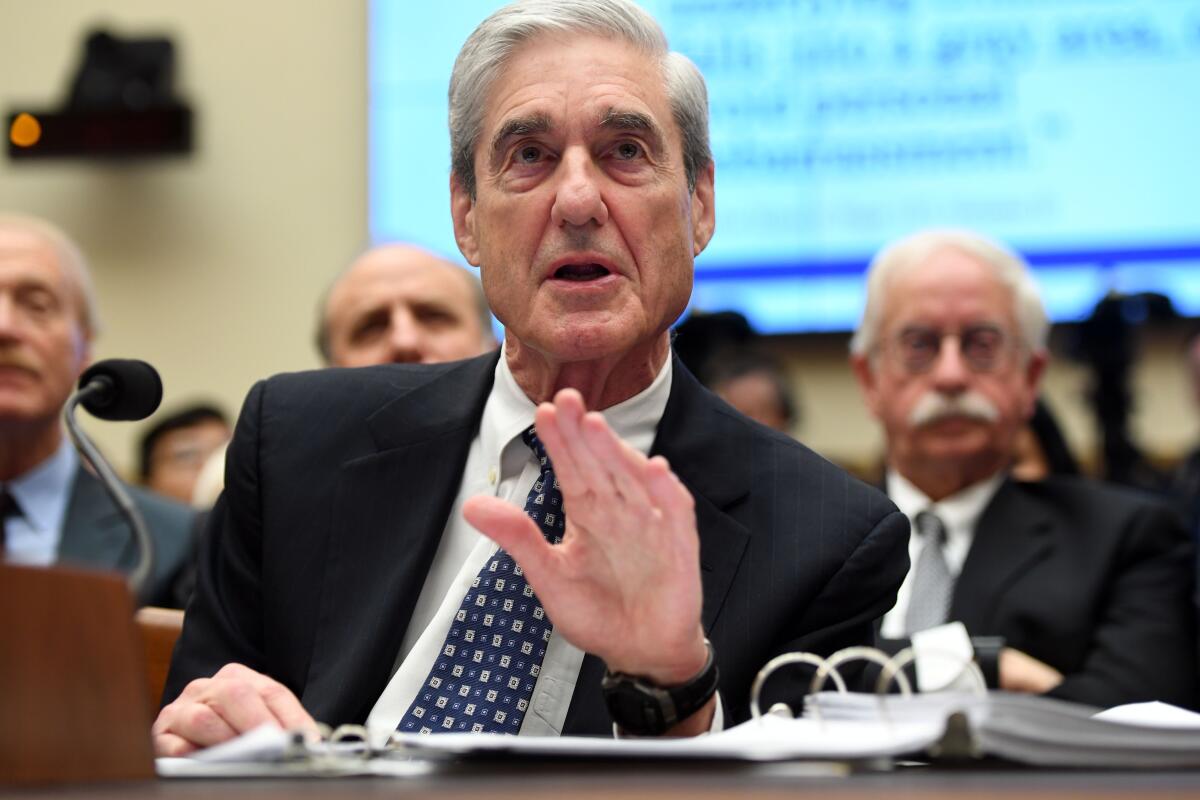
Rep. Doug Collins of Georgia, the top Republican on the House Judiciary Committee, tried to establish that Mueller cleared President Trump of conspiracy in his report.
Collins asked whether the report found that the president was involved in the “underlying crime” of Russian interference in the 2016 presidential campaign.
“We found insufficient evidence of the president’s culpability,” Mueller said, in a soundbite that the president and GOP officials are likely to point to in the future.
Collins and Mueller engaged in a back and forth on whether collusion, which is not a legal term, and conspiracy, which is, are colloquially synonymous terms. Mueller originally said they are not, but when Collins pointed to a point in the report in which Mueller wrote that they’re similar, the former special counsel appeared to change his mind.
“I leave it with the report,” Mueller said.
- Share via
At Washington bars, ‘Mueller time’ means ‘Bloody Muellers’ and ‘Moscow Muellers’
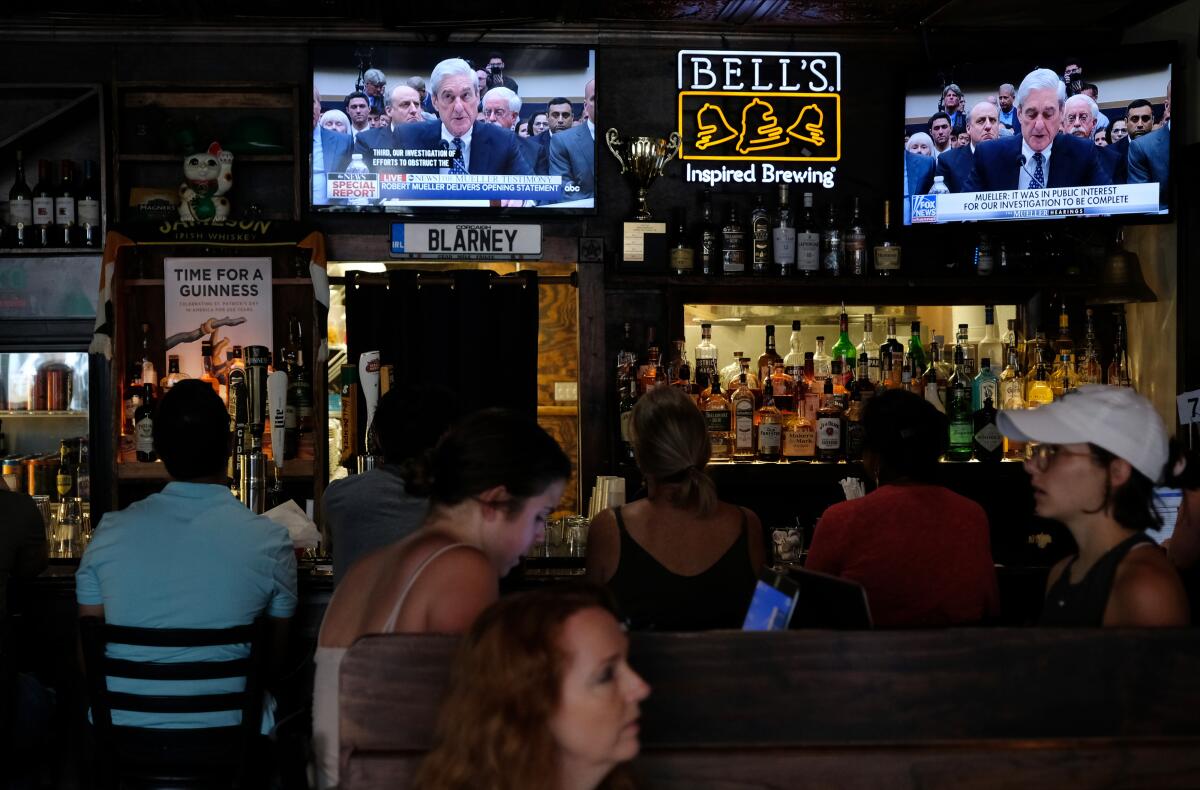
Some Washington bars are taking “It’s Mueller time!” literally.
A few pubs are offering Mueller-themed happy hours and early morning openings to show TV coverage of the back-to-back House hearings. They’ve even come up with Mueller-themed cocktails.
“When there’s a popular hearing such as the Comey hearing or the Cohen hearing or now the Mueller hearing, we oblige the neighborhood and open up early,” said Casey Callister, co-owner of Duffy’s Irish Pub, in the capital’s popular H Street Corridor.
Duffy’s is serving “Bloody Muellers” — Bloody Marys with a flag that says “Mueller.”
The bar was full by 9 a.m. and Callister said he expects more patrons to trickle in during “halftime of the double-header today.”
Union Pub is putting a different twist on the Mueller-themed drink, offering “Moscow Muellers” in honor of the former special counsel’s investigation of Russian meddling in the 2016 presidential campaign.
“Being located right on Capitol Hill, there’s a lot of energy around this,” general manager Ashley Saunders said. “We were hoping to give even more incentive to come out and watch it.”
- Share via
Mueller says his investigation did not exonerate the president
Rep. Jerrold Nadler, chairman of the House Judiciary Committee, asked Robert S. Mueller III a series of simple yet impactful questions about the conclusions of the Russia investigation.
The result was a dismantling of the president’s repeated false claims that he was cleared by prosecutors.
“Did you actually totally exonerate the president?” Nadler asked.
“No,” Mueller said.
Nadler also asked Mueller about Justice Department guidelines that prevent charging a sitting president. Mueller confirmed that the special counsel’s office decided not to address whether Trump committed any crimes because of that.
Nadler asked whether a president can be prosecuted after leaving office.
“True,” Mueller said.
- Share via
Read Robert Mueller’s opening statement
In his opening statement, Robert S. Mueller III listed several areas that he will refuse to comment on today.
He warned members of Congress that he won’t go further than the report and he will not “summarize [the report] in a different way.”
“I will stay within the text,” he said. “I will not comment on the actions of the attorney general or of Congress. I was appointed as a prosecutor. I intend to adhere to that role.”
Mueller said he will respect the Justice Department’s instructions to not comment on ongoing investigations or areas that he doesn’t know about.
Specifically, he said he won’t comment on the initial opening of the FBI’s Russia investigation or the so-called Christopher Steele dossier, both of which could be the subject of questions from Republican members of the panel.
In his opening statement, Robert Mueller listed several areas that he will refuse to comment on today.
- Share via
For some spectators, the Mueller hearing is a high-profile opportunity to protest the president
Molly Pauker, Ian Madrigal and Sophie Lasoff showed up to urge Congress to open an impeachment inquiry into Trump.
“At this point, it’s not a question of whether Trump has committed high crimes and misdemeanors, but how many,” Madrigal said.
Lasoff said Mueller’s appearance could be a “pivotal moment” in the push for an impeachment inquiry.
“We wanted to bear witness,” she said.
But at this point it doesn’t look like they’ll make it into the hearing room.
“We’ve given up,” Pauker said.
They’ve been waiting since 3:30 a.m. but said they couldn’t get into the building until 7, after congressional staffers had already been admitted.
“That’s kind of a disappointment to us, but at least we showed up,” Pauker said.
- Share via
Trump dredges up old complaints in early morning tweetstorm
President Trump said he wouldn’t be watching Robert Mueller’s testimony on Wednesday — “maybe I’ll see a little bit of it,” he admitted — but it appeared to be the only thing on his mind before the hearing started.
The president was tweeting nonstop about the Russia investigation, which he calls a “witch hunt,” and dredging up old complaints about it.
“So Democrats and others can illegally fabricate a crime, try pinning it on a very innocent President, and when he fights back against this illegal and treasonous attack on our Country, they call It Obstruction? Wrong!” he tweeted. “Why didn’t Robert Mueller investigate the investigators?”
In another tweet, Trump referenced almost the entire rogue’s gallery of people he claims have unfairly persecuted him.
“Why didn’t Robert Mueller & his band of 18 Angry Democrats spend any time investigating Crooked Hillary Clinton, Lyin’ & Leakin’ James Comey, Lisa Page and her Psycho lover, Peter S, Andy McCabe, the beautiful Ohr family, Fusion GPS, and many more, including HIMSELF & Andrew W?” he wrote.
- Share via
Read the opening statement from House Judiciary Chairman Jerrold Nadler
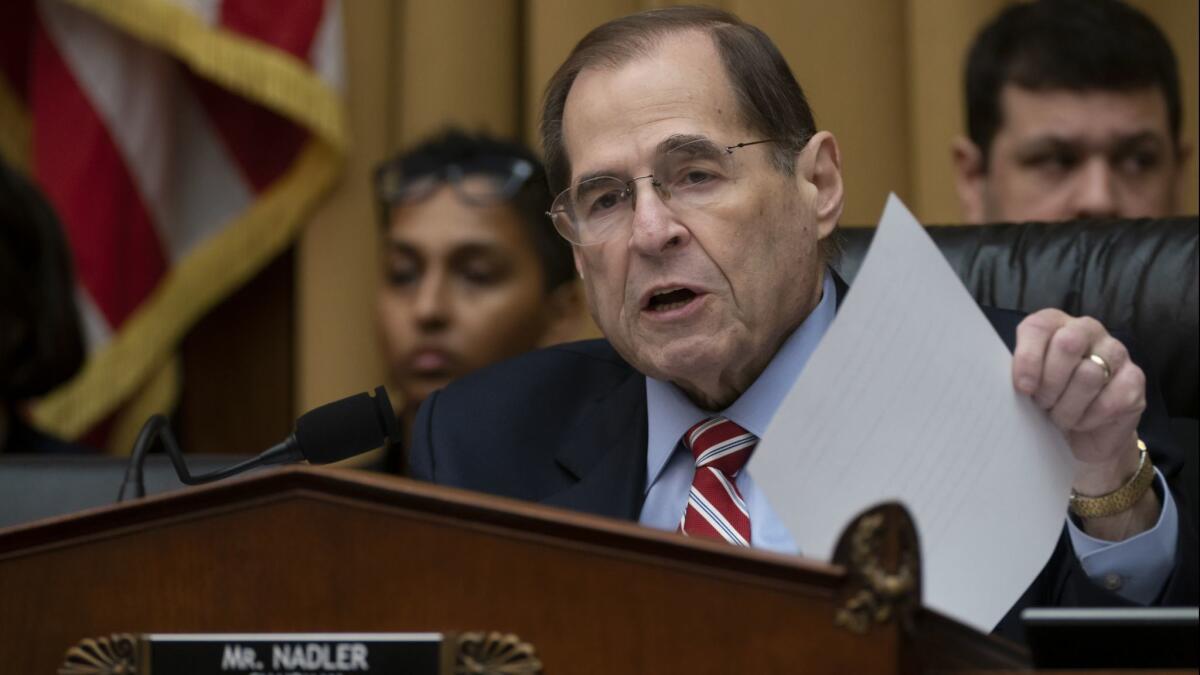
Read House Judiciary Chairman Jerrold Nadler’s opening statement here.
- Share via
‘I’m one energy drink in’: Dozens line up, hoping to get a hearing seat
A seat in the Mueller hearing is one of Washington’s hottest commodities this morning.
Dozens of spectators have lined up in the Rayburn House Office Building to try to get a spot in the hearing room. Some have been waiting all night.
A group of Capitol Hill interns snagged spots at the front of the line. They’ve been waiting outside the hearing room for more than 12 hours.
“A few weeks ago we realized that the Mueller report was going to be in Rayburn and we really wanted to be able to experience it,” intern Katie Camerer said.
“We got here between 6 and 8 p.m. last night and we spent the night on the ground waiting so that we could get into the hearing this morning. Some of us slept in our work clothes, others prepared and brought PJs. We DoorDashed dinner, we had pizza. We talked, hung out, slept for a few hours so that we would be able to get in today.”
So how are they holding up on limited sleep?
“I’m one energy drink in,” Camerer said. “None of the coffee shops are open yet.
- Share via
Mueller arrives on Capitol Hill
- Share via
The biggest questions Mueller could be forced to answer
Lawmakers will be questioning Robert S. Mueller III for five hours total — three before the House Judiciary Committee, then two before the House Intelligence Committee.
Here’s a look at some of the biggest questions that the former special counsel could be forced to address.
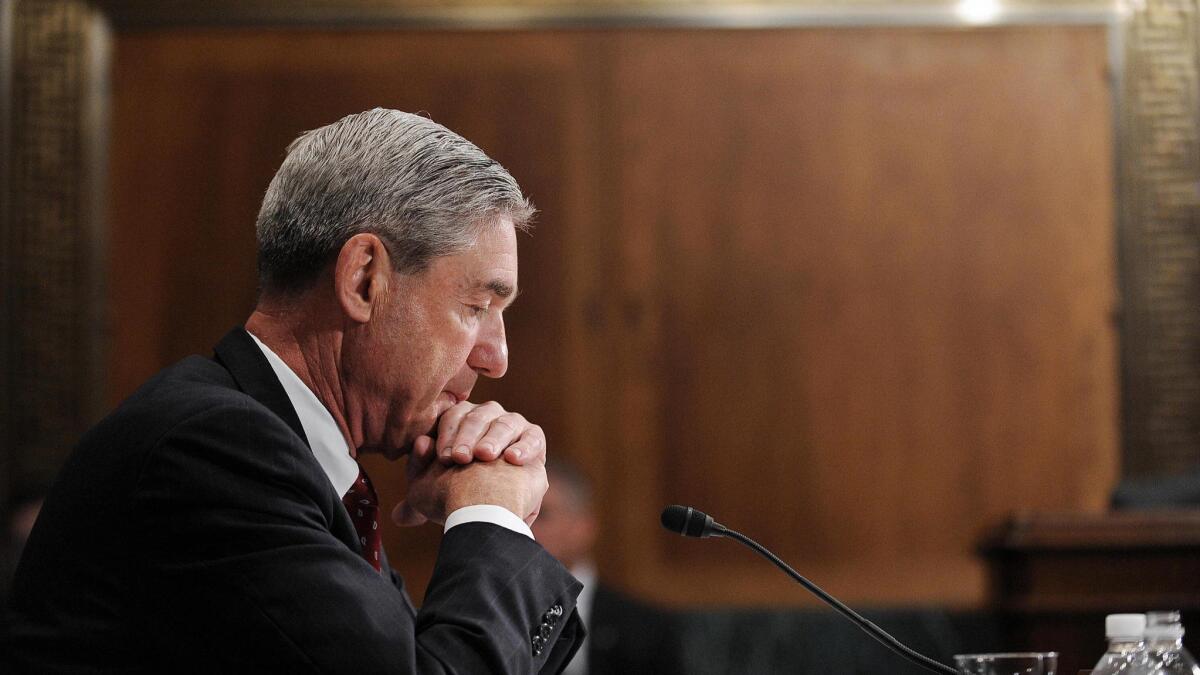
- Share via
Meet Aaron Zebley, the key aide who will appear alongside Mueller
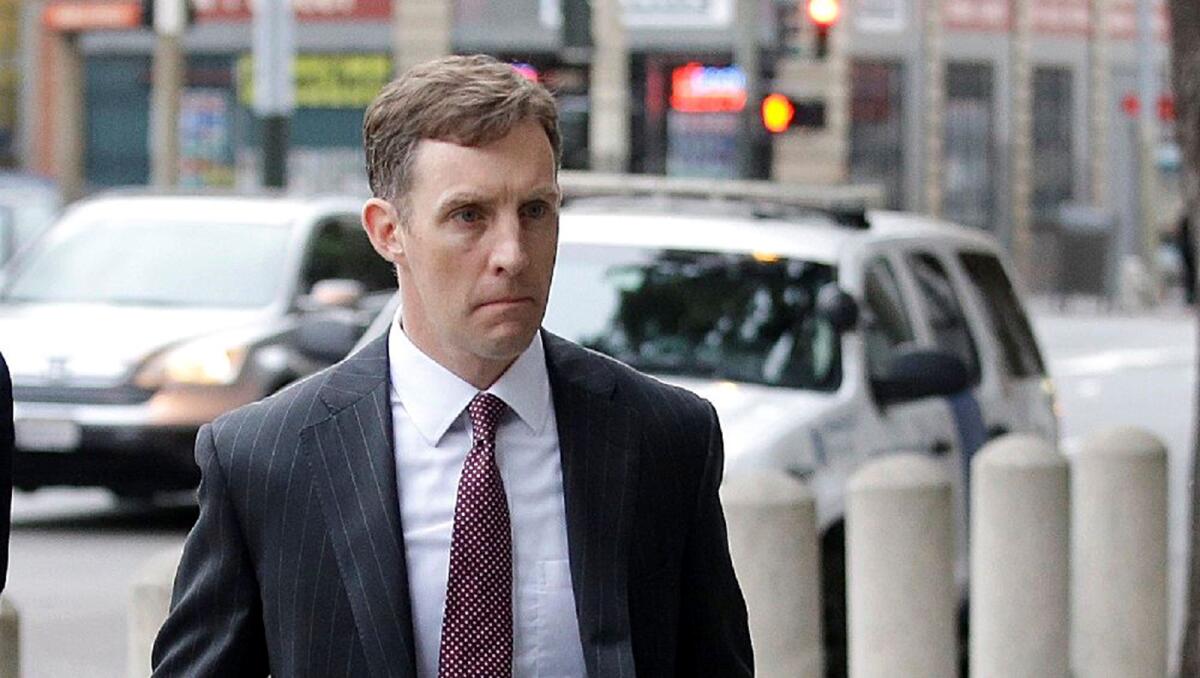
Robert Mueller won’t be the only one sitting at the witness table on Wednesday. Next to him will be Aaron Zebley, a longtime aide and advisor.
Mueller’s former deputy special counsel, Zebley worked on the Russia probe, where he had “day-to-day oversight” of the investigation, according to Mueller spokesman Jim Popkin.
Zebley previously worked as Mueller’s chief of staff when he was FBI director, then joined him in private practice at the WilmerHale law firm.
His appearance will be handled differently during the day’s two hearings. Zebley will be able to confer with Mueller while he testifies before the House Judiciary Committee, but he’ll be sworn in by the House Intelligence Committee, which means Zebley may face questions himself during the second hearing.
Trump was upset by the development. “So Robert Mueller has now asked for his long time Never Trumper lawyer to sit beside him and help with answers,” he tweeted. “What’s this all about?”
- Share via
Watch live: Mueller testimony on the Russia investigation
- Share via
How each party is preparing to question Robert Mueller
Mueller has gained a reputation as a tight-lipped witness during congressional hearings, and he’s wary of partisan showdowns like Wednesday’s hearings will probably become. Democrats and Republicans are each trying to use his testimony for their own goals.
Here’s a look at how each party is preparing to question the former special counsel.
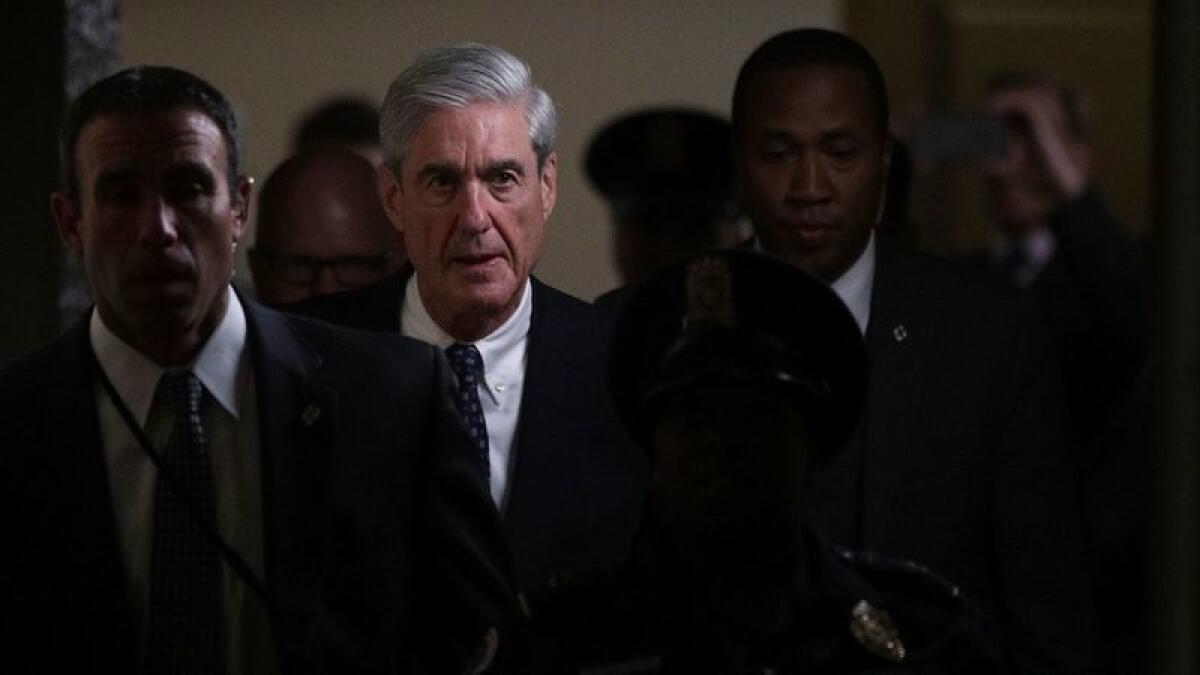
- Share via
Mueller testimony guide: Get caught up here
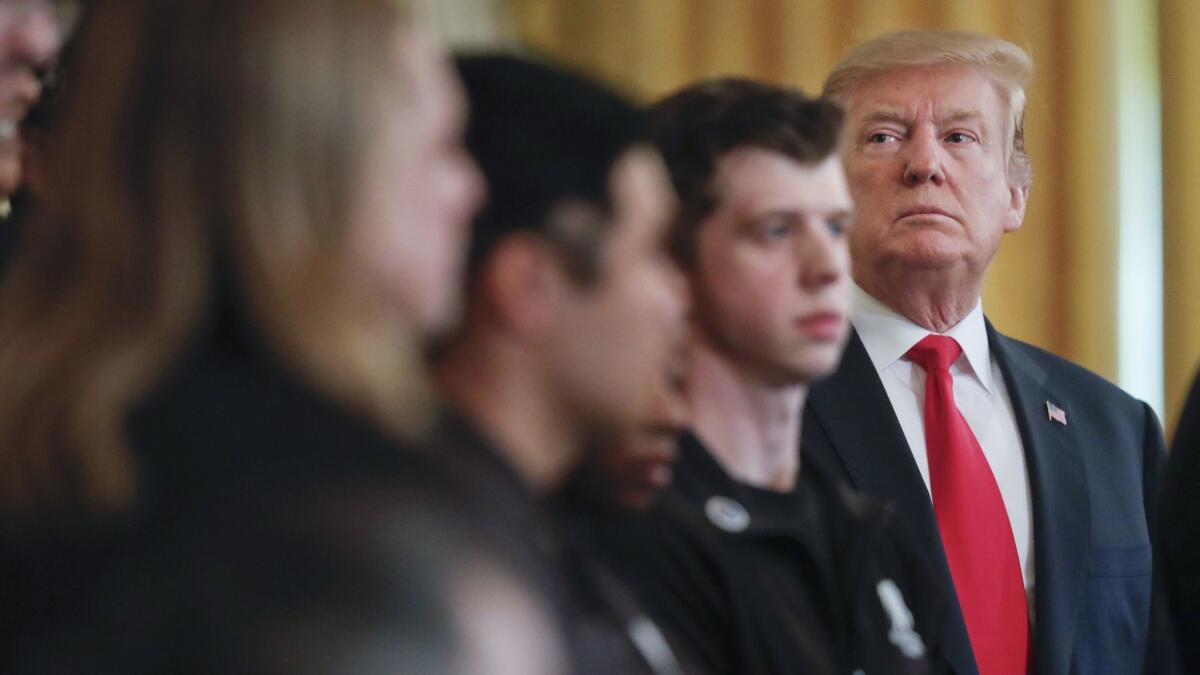
Mueller has said he’ll stick closely to the text of the report that was released in April, so now is a good time to get caught up on what it actually says. You can follow along with his testimony with the report itself or read our previous coverage.
The Russia investigation did not establish a criminal conspiracy between Trump’s campaign and Moscow, but it did show how the president’s team welcomed foreign meddling in the 2016 election.
The report also laid out how Trump repeatedly tried to block, limit or end the investigation. Mueller did not say whether Trump broke the law, citing Justice Department rules that prevent indicting a sitting president.
- Share via
Here’s what to expect when Robert Mueller testifies about the Russia investigation
Former special counsel Robert S. Mueller III’s testimony on Wednesday will be the latest in a series of televised, tweeted, and debated hearings during the Trump presidency. James Comey, Brett Kavanaugh, and Michael Cohen’s appearances in front of Congress provide examples of the type of atmosphere to expect when Mueller fields questions about his report. Here’s a look back at the biggest hearings so far.
